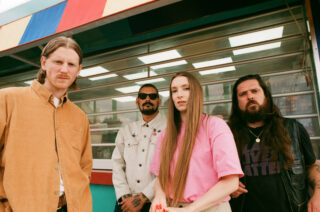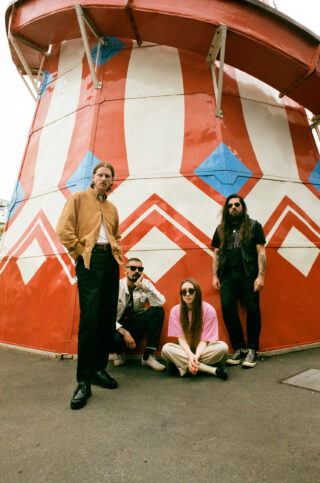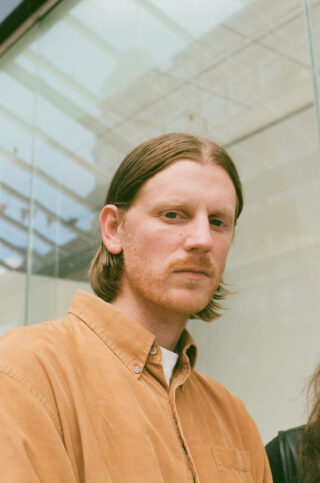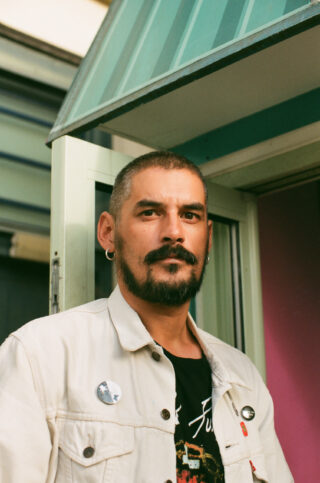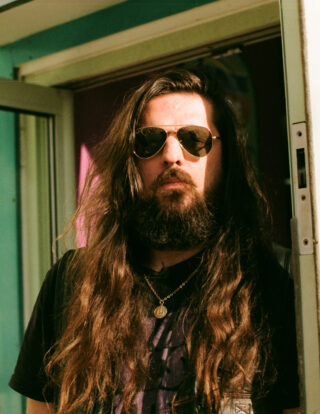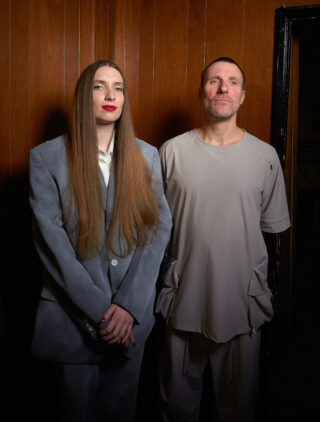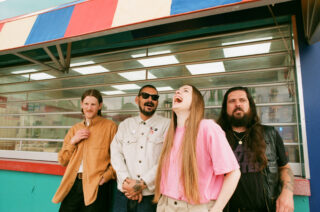The origin story of Dry Cleaning feels fairly comprehensively told by this point, but a recap here for context won’t hurt. Guitarist Tom Dowse, bassist Lewis Maynard and drummer Nick Buxton had been bouncing around garage bands for the best part of twenty years when they decided to put together a new one in 2018, familiar enough by now with the way these things go to expect no greater success than simply having a bit of fun together and making some recordings to send to their mates. However, when Dowse persuaded his non-musician visual artist friend Florence Shaw, who’d never been in bands, to join them on vocals, a eureka moment happened, and the quartet began attracting attention beyond their peers with their unusual combination of motorik, angry/weird post-punk and darkly comic collaged spoken-word lyrics.
Three years and a multi-album deal with the venerable 4AD later, their debut album New Long Leg was released and quickly feted as one of the best records of its generation; this month, album two, Stumpwork, arrived with the sort of anticipation that prompts music magazines to offer up their front covers and take them to Southend, and by then the band will be well into a world tour that will keep them on the road until at least April next year. It’s quite the development for a group whose initial aims were just, according to Dowse, “hanging out together, trying to recapture that early joy, keeping it nice and simple.”
“The idea of having anything like this happening never arose,” he explains, referring to his current life of touring and recording, “because we’d already made our lives doing other things: Flo and I lectured together at the same place, and Nick had a cabinet-making business…” Indeed, so humble were expectations of the band well into their initial lift-off phase that all four of them held onto their day jobs for as long as they could, even after signing a record deal, mainly because they liked what they did. “The feeling for us wasn’t like an ‘Oh wow we could be on the cusp of something really cool here,’” remembers Buxton fondly of the moment that Dry Cleaning’s rise started to feel inevitable. “It was more like a phobia. It was more like ‘Shit, I might have to quit my job to do this? I don’t want to fucking do that!’ because I really enjoyed my work.”
The sense that Dry Cleaning are grown-ups, then, is inescapable, and actually works hugely in their favour. For one, there’s a likeably lived-in, rounded self-assuredness to each of their personalities, with not a hint of the sort of messiah complexes or callow off-the-leash approval-lust often found in buzz bands 15 years their junior. “It’s not like we’re unambitious,” Buxton qualifies at one point, “but it’s maybe just that our ambitions are different from what they’d be if we were younger. I think maybe we’re ambitious less about being out-and-out successful, and more about satisfying ourselves creatively or making something that’s interesting.”
“And based on the evidence of what’s happened so far,” Dowse chips in, “it’s not a bad strategy. Y’know: trust the process, trust your band members who are all chucking in influences—”
“And those contributions are also a result of being a little older as well,” adds Shaw. “Like, I definitely used to have the same music taste as all my friends when I was younger. But then you grow out of that, become more idiosyncratic, and grow your own world, and now I can bring it to the others.”
“And that’s perhaps the most essential thing about being in a band,” returns Buxton, “that you respect one another’s tastes. Everyone in Dry Cleaning brings really good stuff that opens up new avenues. I’ve definitely been in bands where I’ve hated other people’s music tastes, and that’s not cool.”
Talking about their writing process, too, it’s clear that years of experience with the frustrations of Being Creative – whether that’s in music or elsewhere – pays dividends in the studio. “I think having taught at art school helps because I know how to force myself and others to make things,” laughs Shaw about what she can offer to the writing room. “Like, even if I feel fucking terrible and I haven’t got any ideas, I can still do it, which is so much of what making something creative as a job – which is what we’re essentially doing now – is about.”
Equally, a mature approach to listening and being openly self-critical plays just as important a role in making the songs as performing does, and there’s little preciousness involved in recording – another function of age, explains Dowse: “One thing I struggled with in earlier bands is the finality of documentation,” he remembers, “but over the years I’ve come to realise that it’s helpful to think of the record as just the blueprint. There’s a really good Ian MacKaye quote where he says the recording is the menu, and the live show is the meal, which is a really helpful way of looking at it.”
It all adds up to a realisation that Dry Cleaning simply couldn’t exist as a bunch of 21-year-olds – their tenacity, calm and slow-acquired wisdom is at the centre of what makes them such a good band, with their interpersonal interactions the key. “The band is the relationships. That’s all you have, essentially,” acknowledges Buxton, “It’s the filter, again – it’s our collective taste and accumulated experiences, that’s what this band is, and I back everyone here.”
“And the strength of the band,” continues Dowse, “is that when all four of us are in the zone, it’s undeniable.”
In short, Dry Cleaning’s modest sophistication suggests a group far further into their lifespan than a single LP. Indeed, Stumpwork, far from being a Difficult Second Album, is a demonstration of that maturity. Compared to New Long Leg, it’s more layered, richer and more musically ambitious, with more unusual arrangements and song structures. Despite that, though, it also feels just as lean as its predecessor – another tribute to the way the band writes. “I think the goal when we write is always to keep it as short as we can,” explains Dowse, “so with the longer ones on the new record, that’s never self-indulgence. They had to be that long because that’s where the vibe was.”
Accordingly, it’s easy enough to plot from the early EPs to the first album through to the new one what Buxton refers to as “a story of everything slowly opening out.” Despite the increased sonic scope, though, Stumpwork has retained the band’s early insistence and drive, and is just as oddly addictive as New Long Leg, thanks mainly to Dry Cleaning’s not-so-secret weapon of Shaw’s vocal writing and delivery that resembles the contents of a wearily supersaturated brain turned inside out like a rubber jelly mould and plonked onto a countertop, in the plonking perhaps also showing us the insides of our own, too. Of all the lyricists working in pop today, the obsession that Shaw’s everyday prosody inspires seems unparalleled for a band Dry Cleaning’s size.




